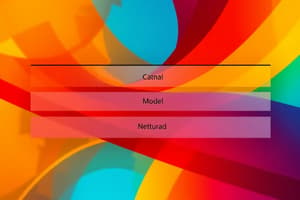Podcast
Questions and Answers
What does the Data Link layer primarily do with the data received from the Physical layer?
What does the Data Link layer primarily do with the data received from the Physical layer?
- Routes data packets based on IP addresses
- Checks for transmission errors and packages bits into frames (correct)
- Delivers data across network connections
- Manages connections between devices
Which of the following is NOT a task performed by the Network layer?
Which of the following is NOT a task performed by the Network layer?
- Routing data packets to their final destination
- Examining source and destination addresses
- Facilitating physical address management using MAC addresses (correct)
- Maintaining logical addresses like IP addresses
Which protocol is the most common example of a Transport Layer network protocol?
Which protocol is the most common example of a Transport Layer network protocol?
- TCP (correct)
- FTP
- HTTP
- UDP
What is the primary function of the Media Access Control (MAC) sublayer within the Data Link layer?
What is the primary function of the Media Access Control (MAC) sublayer within the Data Link layer?
Which layer is responsible for establishing and managing network connections in a way that supports multiple types of connections?
Which layer is responsible for establishing and managing network connections in a way that supports multiple types of connections?
What is the purpose of the Address Resolution Protocol (ARP) in networking?
What is the purpose of the Address Resolution Protocol (ARP) in networking?
In the context of the OSI model, which layer formats the data into packets before passing it to the Transport layer?
In the context of the OSI model, which layer formats the data into packets before passing it to the Transport layer?
Which of the following best describes a key function of the Transport Layer?
Which of the following best describes a key function of the Transport Layer?
What is one of the primary benefits of learning the OSI model?
What is one of the primary benefits of learning the OSI model?
Which OSI layer is responsible for the transmission of digital data bits?
Which OSI layer is responsible for the transmission of digital data bits?
What layer of the OSI model deals with network requests and responses from a user's perspective?
What layer of the OSI model deals with network requests and responses from a user's perspective?
Why is the OSI model considered primarily a teaching tool?
Why is the OSI model considered primarily a teaching tool?
What technology is NOT typically associated with the Physical Layer of the OSI model?
What technology is NOT typically associated with the Physical Layer of the OSI model?
What role does the ARP protocol play in communication with a Web server?
What role does the ARP protocol play in communication with a Web server?
Which function does the OSI model facilitate among technical professionals?
Which function does the OSI model facilitate among technical professionals?
At which OSI layer is the Web request encapsulated into a message for transmission?
At which OSI layer is the Web request encapsulated into a message for transmission?
What is required for a computer to send a request to a Web server on the Internet?
What is required for a computer to send a request to a Web server on the Internet?
What is the primary role of the lower layers in the OSI model?
What is the primary role of the lower layers in the OSI model?
Which OSI layer is responsible for providing the means to transmit messages to the default gateway?
Which OSI layer is responsible for providing the means to transmit messages to the default gateway?
Which of the following is NOT a component of the Physical Layer in the OSI model?
Which of the following is NOT a component of the Physical Layer in the OSI model?
What is the first step a computer takes when sending a request to a Web server?
What is the first step a computer takes when sending a request to a Web server?
What is the primary function of the Presentation layer in the OSI model?
What is the primary function of the Presentation layer in the OSI model?
Which layer supplies network services directly to end-user applications?
Which layer supplies network services directly to end-user applications?
What role does a Web browser play in the Application layer?
What role does a Web browser play in the Application layer?
Which of the following activities is NOT typically handled by the Presentation layer?
Which of the following activities is NOT typically handled by the Presentation layer?
How does the Application layer relate to the Presentation layer?
How does the Application layer relate to the Presentation layer?
During the process of requesting a Web page, which layer is primarily involved in finding the Web server and requesting the desired file?
During the process of requesting a Web page, which layer is primarily involved in finding the Web server and requesting the desired file?
What does the Presentation layer utilize to support the Application layer above it?
What does the Presentation layer utilize to support the Application layer above it?
Which of the following describes an essential activity performed by the Application layer?
Which of the following describes an essential activity performed by the Application layer?
What is the primary function of the PRESENTATION layer?
What is the primary function of the PRESENTATION layer?
When a web page is requested, what does the web browser do after opening a TCP connection with the web server?
When a web page is requested, what does the web browser do after opening a TCP connection with the web server?
What role do HTML tags play within a web page?
What role do HTML tags play within a web page?
What does the TCP protocol do when transmitting a web page?
What does the TCP protocol do when transmitting a web page?
What distinguishes IP as a NETWORK layer protocol?
What distinguishes IP as a NETWORK layer protocol?
In what situation might a web browser launch an external application?
In what situation might a web browser launch an external application?
What does each TCP connection represent in relation to web interactions?
What does each TCP connection represent in relation to web interactions?
During the process of requesting a web page, what is the sequence of actions involving TCP and SESSION?
During the process of requesting a web page, what is the sequence of actions involving TCP and SESSION?
Flashcards
OSI Model
OSI Model
A networking framework that divides network architecture into 7 layers, enabling communication between systems using protocols.
Physical Layer
Physical Layer
The lowest layer of the OSI model; responsible for transmitting bits over the network medium (e.g., cable, wireless).
Network Architecture
Network Architecture
A structured approach to implementing networking protocols in layers.
Teaching Tool
Teaching Tool
Signup and view all the flashcards
Troubleshooting
Troubleshooting
Signup and view all the flashcards
Networking Protocols
Networking Protocols
Signup and view all the flashcards
Data Transmission
Data Transmission
Signup and view all the flashcards
Network Devices
Network Devices
Signup and view all the flashcards
Physical Layer
Physical Layer
Signup and view all the flashcards
Data Link Layer
Data Link Layer
Signup and view all the flashcards
Network Layer
Network Layer
Signup and view all the flashcards
Transport Layer
Transport Layer
Signup and view all the flashcards
Session Layer
Session Layer
Signup and view all the flashcards
Data Frames
Data Frames
Signup and view all the flashcards
Logical Addresses
Logical Addresses
Signup and view all the flashcards
Physical Addressing
Physical Addressing
Signup and view all the flashcards
Presentation Layer Function
Presentation Layer Function
Signup and view all the flashcards
Application Layer Role
Application Layer Role
Signup and view all the flashcards
Application Layer Protocols
Application Layer Protocols
Signup and view all the flashcards
HTTP Protocol
HTTP Protocol
Signup and view all the flashcards
Web Browser Application
Web Browser Application
Signup and view all the flashcards
Web Server Function
Web Server Function
Signup and view all the flashcards
Presentation Layer Function (simplified)
Presentation Layer Function (simplified)
Signup and view all the flashcards
Application Layer function (simplified)
Application Layer function (simplified)
Signup and view all the flashcards
IP Protocol
IP Protocol
Signup and view all the flashcards
ARP Protocol
ARP Protocol
Signup and view all the flashcards
Default Gateway
Default Gateway
Signup and view all the flashcards
Data Link Layer
Data Link Layer
Signup and view all the flashcards
Physical Layer
Physical Layer
Signup and view all the flashcards
Presentation Layer
Presentation Layer
Signup and view all the flashcards
HTTP Conversions
HTTP Conversions
Signup and view all the flashcards
TCP Connection
TCP Connection
Signup and view all the flashcards
Web Page Session
Web Page Session
Signup and view all the flashcards
HTML Tags
HTML Tags
Signup and view all the flashcards
Transport Layer (TCP)
Transport Layer (TCP)
Signup and view all the flashcards
IP (Network Layer)
IP (Network Layer)
Signup and view all the flashcards
Webpage request
Webpage request
Signup and view all the flashcards
Study Notes
Why Should We Learn the OSI Model?
- Learning the OSI model helps understand functions, web browser workings, internet protocol, ARP, and MAC addresses.
- Learning the OSI model simplifies troubleshooting computer problems.
- Communicating with technical people and discussing issues is aided by the OSI model.
OSI Model
- The OSI model is a networking framework for implementing protocols using layers.
- It divides computer networks into logical layers (7 layers in total).
- Lower layers manage electrical signals, data chunks, and routing.
- Higher layers handle network requests, responses, data representation, and protocols from a user's perspective.
- The OSI model provides a standard architecture for building network systems.
- Many popular network technologies reflect the OSI model's layered design.
Physical Layer
- Layer 1 is responsible for ultimate digital data transmission.
- Layer 1 uses physical media (e.g., cables, radio frequencies, infrared).
- Technologies like Ethernet and Token Ring operate at this layer.
- Hubs, repeaters, and connectors are physical layer devices.
Data Link Layer
- Checks physical transmission errors.
- Packages bits into frames.
- Manages physical addressing (e.g., MAC addresses).
- Controls access to physical media.
- Divided into Media Access Control and Logical Link Control sublayers.
Network Layer
- Manages routing above the data link layer.
- Examines data source and destination addresses.
- Maintains logical addresses (e.g., IP addresses).
- Maps logical addresses to physical ones (e.g., using ARP).
- Formats data into packets to be sent to the transport layer.
Transport Layer
- Delivers data across network connections.
- TCP is a common example of a transport layer protocol (for handling error recovery, flow control, and re-transmission).
Session Layer
- Manages the sequence and flow of network events and connections that can be dynamically created.
Presentation Layer
- Handles syntax processing (e.g., format conversions, encryption, decryption).
- Simplest function of any piece of the OSI model.
Application Layer
- Provides network services to end-user applications.
- Used by protocols for tasks like transferring web page content (e.g., HTTP).
- Layers work together, passing data to each other for different tasks.
Studying That Suits You
Use AI to generate personalized quizzes and flashcards to suit your learning preferences.
Related Documents
Description
This quiz explores the OSI model, a fundamental networking framework that breaks down internet communication into seven distinct layers. You'll learn about each layer's functions, including how they interact with data transmission and troubleshooting issues. Understanding the OSI model is essential for anyone involved in networking and communication.




